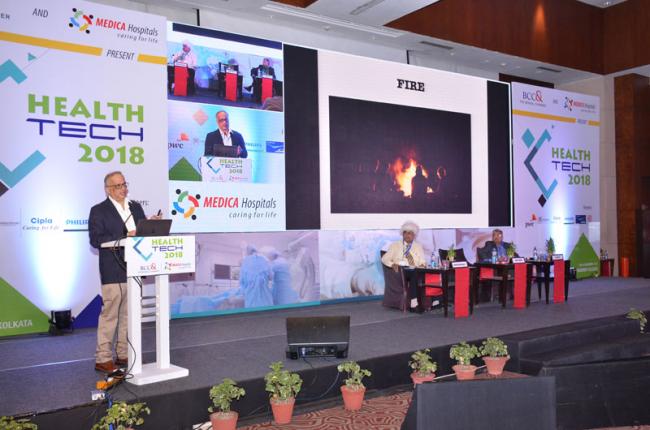
HealthTech 2018: Using technology for better health care implementation
Kolkata, Mar 11 (IBNS): Bridging the gap between Indian healthcare and the use of technology was one of the key areas of discussion at the Health Tech 2018, a four-day conference, organised by The Bengal Chamber of Commerce & Industry, in association with Medica Superspeciality Hospital, in Kolkata.
Technology is almost single-handedly responsible for changing the entire landscape and philosophy of human existence, and the healthcare sector is no different.
Today, with a rapidly increasing population, there exists a significant gap in the number of healthcare providers available and the number of those who require quality healthcare. This inequality in numbers can have adverse effects, but this is where technology can step in and make a great impact.
Healthcare is embracing rapid digitisation, and thanks to medical apps, video conferencing, Internet of Things (IoT), and other such technologies, it is possible to navigate this situation and bring healthcare to the doorstep of every Indian, was discussed in detail at the conference.
 Now, there are a plethora of apps available where one can post medical queries, upload medical reports and test results, and get advice from qualified doctors, and this is just one of the many examples that show how healthcare and technology are quickly merging together.
Now, there are a plethora of apps available where one can post medical queries, upload medical reports and test results, and get advice from qualified doctors, and this is just one of the many examples that show how healthcare and technology are quickly merging together.
The various themes on which the seminar focused were - Technology that is driving the future of healthcare sector, Entrepreneurships in Health Tech, and New Technologies for high-end delivery.
One of the highlights was the release of a PricewaterhouseCoopers thought paper on “Reimagining the possible in the Indian healthcare ecosystem with emerging technologies”.
"The objective of this programme was to bring all stakeholders in the healthcare sector under one roof to exchange ideas and best practices as it emerges in a continuously evolving environment," said Dr. Alok Roy, Past President, The Bengal Chamber of Commerce and Industry, and Chairman, Medica Group of Hospitals.
“The Health Tech programme is an exceptional platform for networking and taking business collaboration forward with global partners. Technology is changing every day. What is in vogue today may become obsolete soon; so design and technology together can shape the future for the industry players,” said Dr. Roy.
At the conference, various subject experts spoke in detail how cooperation between technology and people can ultimately produce amazing achievements and help us push the barriers of medical science.
Digital technology in medicine and healthcare can transform unsustainable healthcare systems into sustainable ones, equalize the relationship between medical professionals and patients, make medical services cheaper and faster, and provide effective solutions and overcome the struggle to cope with deadly diseases like cancer, AIDS or Ebola, and gradually give rise to healthier citizens in healthier ecosystems, the speakers highlighted.
The programme was flagged off on March 8.
The scope of West Bengal being the preferred destination for healthcare stakeholders was addressed by Moloy Banerjee, Managing Director, Linde India Limited.
Overseas perspective was addressed by Archil Dzuliashvili, Ambassador of Georgia to the Republic of India, followed by speeches from dignitaries from various countries, including Thailand, Nepal, Sri Lanka, and Bangladesh. Trade Commissioner from the Canadian High Commission was also present.
{image_2}“The Chamber has always endeavoured to connect technology end users with developers in co-creating better environment and enabling an ecosystem with better enterprise planning, easier manufacturing process, and faster services at lesser costs. Above all, the Chamber acts as a co-player with state government as a promoter and facilitator of West Bengal as business destination”, said Arnab Basu, Chairperson, IT Committee, The Bengal Chamber and Partner and Technology Consulting Leader, PricewaterhouseCoopers.
Other key participants included Dr. Rana Mehta, Partner, Leader Healthcare, PricewaterhouseCoopers; Sanjiv Mehta, Country Manager- Education, Healthcare and Startups, HP; Sumit Puri, CIO, Max Healthcare; Nand Kishore Dhomne, VP-IT & CIO, Manipal Hospitals; Girish Kopper, Sr. Manager-IT, Lilavati Hospitals; Dr. Arpan Pal, Principal Scientist & Head Embedded Systems & Robotics, TCS Research & Innovation, TATA Consultancy Services, among others. Overseas participants included Japan External Trade Organisation (JETRO) which is under Ministry of Economy, Trade & Industry, Government of Japan. Representing JETRO was Chief Director General, Kazuyu Nakajo.
The seminar concluded on March 11 with the theme ‘New Age Technologies for High End Delivery’.
Dr. Kunal Sarkar, Sr. Vice Chairman, MEDICA Superspeciality, spoke about Artificial intelligence (AI) as the fourth industrial revolution.
Dr. Munal Mahabub, Vice President, Chittagong Women Chamber, Chief Hospital Head (Surgiscope Hospital Ltd), Member (Sub Committee) Chittagong Chamber of Commerce and Industry spoke on the topic 'Technologies for Circumcision – A Possible area of Business collaboration' with special focus on India and Bangladesh.
Prof. (Dr.) Rabin Chakraborty, Sr. Vice Chairman, MEDICA Superspeciality Hospital, who is trained in robotics, said, “Technology is here to assist physicians and caregivers in speeding up the service for end users. By enhancing the process of delivery, doctors will be doing their work with aid of robotics, remote sensors and artificial intelligence that will take medical service to new frontiers with less human error and faster effective results.”
The participants at the conference agreed that expanding reliance on technology in healthcare is expected to boost this service sector tremendously with better professional and patient equation by consistent use of centralised database.
Support Our Journalism
We cannot do without you.. your contribution supports unbiased journalism
IBNS is not driven by any ism- not wokeism, not racism, not skewed secularism, not hyper right-wing or left liberal ideals, nor by any hardline religious beliefs or hyper nationalism. We want to serve you good old objective news, as they are. We do not judge or preach. We let people decide for themselves. We only try to present factual and well-sourced news.







